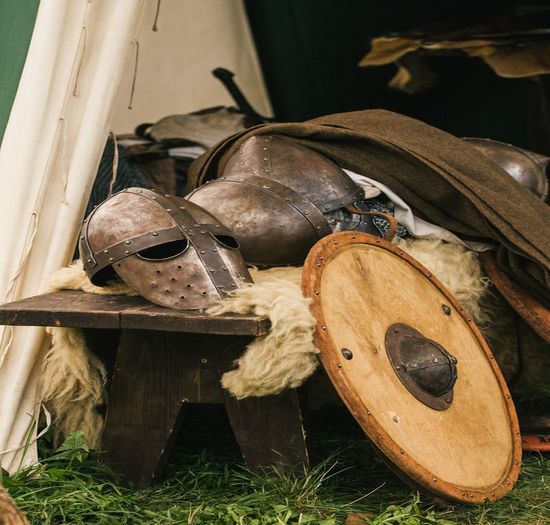Joshua was an iconic leader in the Old Testament of the Bible. As a successor to Moses, starting in the book of Joshua, he was both a humble servant of God and a strong warrior. God called Him to lead the nation of Israel to take possession of Canaan, the Promised Land—a task he took on with faith and courage.
Sounds like an inspiring individual, doesn’t he?
There’s a lot we can learn from his life.
Here are some questions we’ll answer about him:
- Who was Joshua?
- What was Joshua’s part in key events of Israel’s history?
- What lessons can we learn from his story?
Let’s jump in.
Who is Joshua in the Bible?
While the Israelites were on their long journey from Egypt to Canaan, Joshua became their second leader after the death of Moses (Deuteronomy 31:3; Joshua 1:2). He was the son of Nun from the tribe of Ephraim (Numbers 13:8).
He was originally known as Hoshea—which means “saves”—but later on Moses called him Joshua or Jehoshua, meaning “God saves” (Numbers 13:16).
All through his life, Joshua lived out the meaning of his name: He trusted God to save him and the people of Israel from their enemies.
The interesting thing about Joshua is that he had a dual role. Unlike Moses, he was both a military leader and a spiritual leader.
Let’s unpack that.
Joshua the warrior
From early on in Joshua’s life, the Bible distinguishes him as a valiant warrior. One of the first mentions of Joshua is in Exodus 17:8–13, soon after the Israelites crossed the Red Sea from Egypt. There, he led a counter-attack on the Amalekites.

Photo by Michal Matlon on Unsplash
Because of faithfulness in his duty, the Lord gave him victory. Later, He entrusted Joshua with leading the Israelites in the conquest of the Promised Land. Through these stories, we catch a glimpse of his skillfulness and strategy in war (Joshua 8, 10, and 11).
Joshua the servant-leader
Joshua was Moses’ successor for the leadership of the Israelites. But before being a leader, he learned to be a servant.
While Moses was alive, Joshua—though only a young man at the time—worked very closely with him as his assistant (Exodus 24:13). He even had the opportunity to go up on Mount Sinai with Moses, an experience which no doubt impressed upon him the reality and power of God.
Through serving Moses and being mentored by him, Joshua learned faithfulness in small things (Exodus 33:11; 17:8). He also followed Moses’ example of closeness with God. We see throughout Joshua’s life how he called out to God in every situation and obeyed Him (Joshua 5:14–15; 7:6–8).
What was Joshua’s role in the key events of Israel’s history?
Before and after becoming Israel’s leader, Joshua played an important part in key events of Israel’s history:
- He was one of the 12 spies sent to gather information on the land of Canaan
- He led Israel into Canaan
- The Israelites conquered Jericho under his command
- He led in the conquest of Canaan
- He gave Israel a final charge and renewed God’s covenant with them
Let’s go on a quick journey through this history.
Spying out the Land of Canaan
When God’s people came to the borders of Canaan for the first time, the Lord instructed Moses to send out spies into the land (Numbers 13:2–20). Joshua was among those men.
Expectations must have been high in the camp when the spies returned after being gone for 40 days.

Photo by David Köhler on Unsplash
But soon, discouragement flooded in as ten of the spies gave a negative report. The cities were fortified, and the people were giants (verses 26–29, 31–33). How could the Israelites overcome all of the Amalekites, Hittites, Jebusites, Amorites, and the Canaanites?
As morale fell, the people became angry and questioned God for bringing them there. Some suggested going back to Egypt.
That’s when Caleb and Joshua spoke up. They pled:
“If the LORD delights in us, He will bring us into this land and give it to us.… Only do not rebel against the LORD” (Numbers 14:8–9, ESV).
Everyone around him was succumbing to fear, forgetting to have faith in God being able to lead them. But Joshua was willing to take an unpopular stand for what he believed in, even though the people were ready to stone him (verse 10).
Because of the Israelites’ disobedience, God did not permit them to enter the Promised Land. Only the next generation would be able to—that is, except Caleb and Joshua. They had held firmly to their faith in God (verse 30).
Assuming leadership of Israel
Not long before his death, Moses appointed Joshua as the new leader of Israel (Numbers 27:18–23). He charged Joshua with these words from God:
“Be strong and courageous, for you shall bring the people of Israel into the land that I swore to give them. I will be with you” (Deuteronomy 31:23, ESV).
After Moses died, God’s blessing came upon Joshua just as it had been on Moses:
“And Joshua the son of Nun was full of the spirit of wisdom, for Moses had laid his hands on him. So the people of Israel obeyed him” (Deuteronomy 34:9, ESV; see also Joshua 1:5).
Entering Canaan
The first task before Joshua was to lead Israel into the Promised Land. This involved crossing the vast Jordan River (Joshua 1:10–11).
But even there, God was blessing Joshua.
Joshua 3 records how God parted the waters so that the people could cross over.
As a memorial of the miracle, Joshua instructed the people to place special stones of remembrance on the river bank to show their descendants (Joshua 4:1–9).
Through this event, God was fulfilling the promise to exalt Joshua before Israel just as he had done for Moses (verse 14).
Conquering Jericho
One of the most iconic victories in the Bible is the Battle of Jericho, led by Joshua himself (Joshua 6).
Jericho (which still exists in the modern-day Jordan Valley, east of Jerusalem) was one of the first cities that the Israelites encountered in Canaan. God appeared to Joshua, promising that Jericho was already theirs (verse 2).
But the war strategy was unusual:
The armed men and seven priests were to march around the city every day for six days. But on the seventh day, they were to march seven times, and then the priests were to blow their trumpets. The whole army would shout a loud war cry.
As they followed these instructions, the walls of Jericho collapsed, and Israel took the city.
Leading the conquest of Canaan
Jericho was Joshua’s first conquest in Canaan. But many more would follow.
The next city was Ai. While trusting in the Lord, Joshua also used a wise strategy in his ambush (Joshua 8).
And then, another iconic battle.

Photo by Aaron Burden on Unsplash
Joshua and his army went to fight against five kingdoms. Always a man of prayer, Joshua turned to God when he realized that the sun was setting and they would not have enough time to gain the victory that day.
He prayed for the sun and moon to stand still, and God answered him (Joshua 10:12–13)!
God continued to guide Joshua in conquering the rest of Canaan, including the giants that the Israelites had so feared (Joshua 11:21–22).
When finished, Joshua divided the land among the 12 tribes of Israel (Joshua 11:23). As a true servant-leader, he waited until everyone else had received their allotted portion before taking his (Joshua 19:49).
Giving his final charge and renewing the covenant
As Joshua neared the end of his life, he gathered all the leaders of Israel one last time for a final charge and renewal of their covenant with God (Joshua 23:2; 24:1–28).
He reminded them of how God came through for them in all their battles against their enemies. He urged them to cling to God and warned them of the consequences if they did not do so.

Photo by Vladislav Babienko on Unsplash
Then, he spoke these well-known words:
“Choose this day whom you will serve, whether the gods your fathers served in the region beyond the River, or the gods of the Amorites in whose land you dwell. But as for me and my house, we will serve the Lord” (Joshua 24:15, ESV).
Joshua died at 110 years of age (Joshua 24:29–30). He was buried in the land of his inheritance, Timnath Serah (which was located in what we know today as modern-day Israel).
But through the Bible, Joshua’s life of courage and commitment continues to speak to us.
What lessons can we learn from Joshua?
Here are some key lessons from Joshua’s life:
- A true leader is first a servant
- Having a good mentor can shape you for your destiny
- True faith means obeying God even when His instructions don’t seem to make sense in human eyes
- Integrity enables us to stand for the truth, even when faced with severe opposition
- Consistency and a connection with God are key elements of true bravery
- God wants us to cooperate with Him, using our skills, talents, and strategies as we rely on Him
Living the life of Joshua
After God brought the Israelites out of Egypt, Joshua was just the person He needed for the conquest of Canaan. His skill in the art of war and his close walk with God gave him the qualifications to accomplish this formidable task.
Though we may not be fighting physical battles or conquering land, we still need the kind of faith, integrity, and courage that characterized Joshua’s life.
And the good news is: We can still have those qualities today by depending on the Lord as Joshua did.
The God who saved in Joshua’s time is still the God who saves today.
Want to learn more about how God guided the Israelites?
Related Articles
More Answers
Life Lessons from Joseph in the Bible
Joseph is one of the more well-known people from the Bible’s Old Testament. He showed remarkable strength, faith, and patience—even while facing great difficulty and injustice. All because he let God lead.
Understanding Prophecy in the Bible
Seventh-day Adventists have emphasized Bible prophecy from the beginning. We have our roots in the study of God’s Word, especially the prophecies that have to do with the future.
How Do You Tell a False Prophet From a True Prophet?
Have you ever wondered how people in Bible times were able to tell if their prophets were actually from God?
All About the Old Testament
The Old Testament is the first section of the Bible and makes up about three-quarters of its material. It lays out the story of Creation, humanity’s fall into sin, and God’s promise to rescue us from sin.
Didn’t find your answer? Ask us!
We understand your concern of having questions but not knowing who to ask—we’ve felt it ourselves. When you’re ready to learn more about Adventists, send us a question! We know a thing or two about Adventists.








